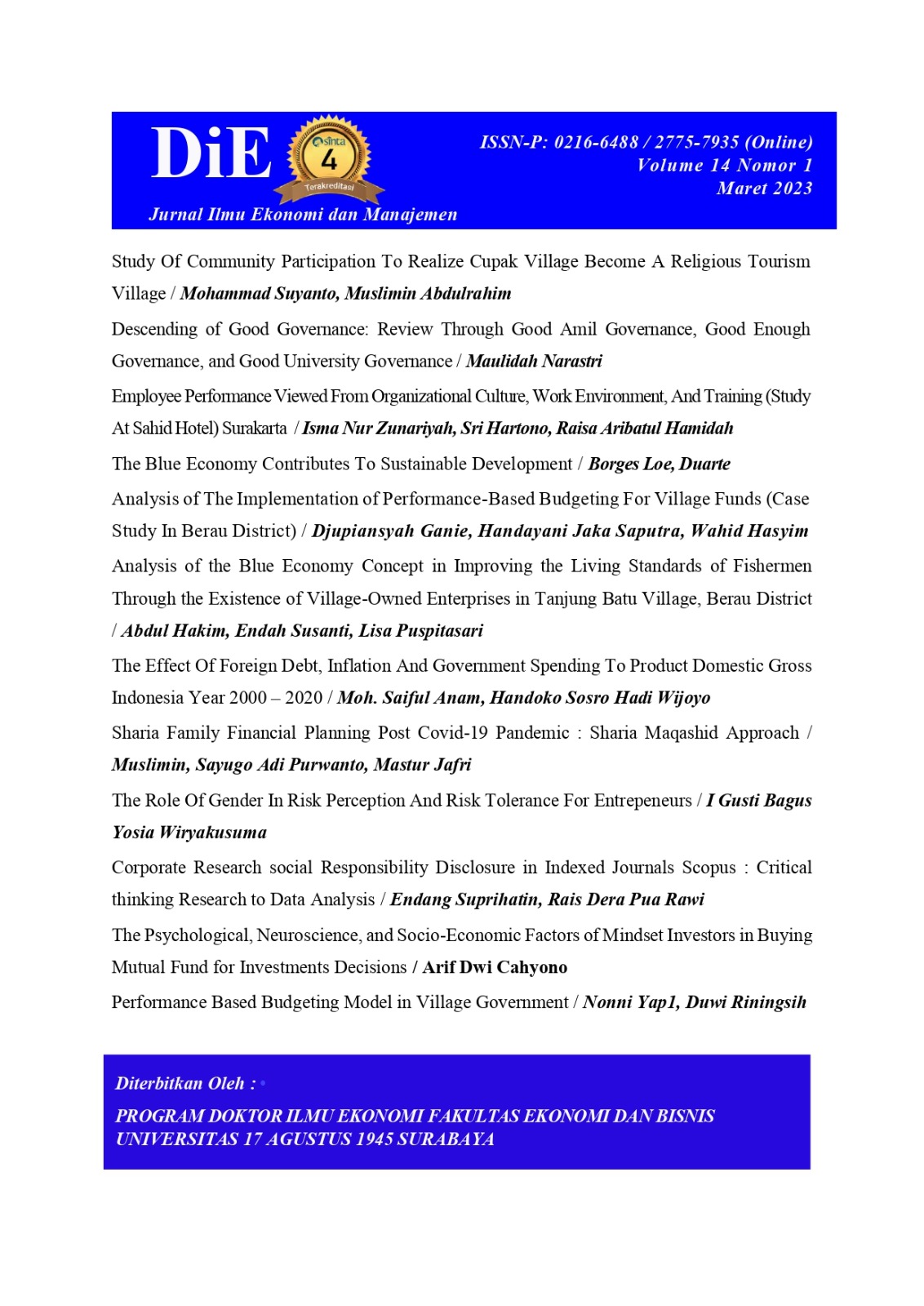Budget,Data,Development Performance Based Budgeting Model in Village Government
DOI:
https://doi.org/10.30996/die.v14i1.8219Keywords:
Budget, Data, Development, GovernmentAbstract
This article analyzes what arises from the use of traditional budgets with budget reforms, namely applying Performance-Based Budgeting (PBB) to the APBD. Appropriate, clear and real application and accountability are needed so that government and development violations can take place in an efficient and successful manner. The development of community needs will become the basis for thinking about how to operate autonomy so as to achieve the goal of increasing the standard and quality of people's lives. This article uses a qualitative method, namely data acquisition which is carried out through a literature review study and with the stages of presenting data and results of research data. The results show that there are significant differences in financial performance based on economic ratios, effectiveness, and regional independence ratios indicating that efforts to implement performance-based budgeting have been able to reduce the uneconomic use of regional expenditures used by the government and the ability of local governments to realize planned revenues compared to set targets has been running effectively. Then for benchmarks and performance through health and education services it shows an increase in the human development index number.
Keywords: Budget, Data, Development, Government
Downloads
References
Journal of Economics & Public Policy, 7(1), 15–28.
Kurrohman, T. (2013). Evaluation of performance-based budgeting through financial performance
based. Journal of Accounting Dynamics, 5(1), 1–11.
Ledo, D., & Ayem, S. (2017). The Influence of Regional Financial Management Aspects on
Transparency in Regional Financial Management (Case Study on SKPD Kota Yogyakarta).
Journal of Business Studies, 25(2), 226–234.
Luthfia, M., & Siregar, B. (2016). How Do Governments Spend Their Public Spending? economia,
12(2), 135–145.
Nanda, R., & Darwanis, D. (2016). Performance-Based Budget Implementation Analysis At
Local government. Scientific Journal of Accounting Economics Students (JIMEKA), 1(1), 327–340.
Nurfauziya, A., Prakosa, K. B., & Kusuma, H. (2018). Impact of Fiscal Decentralization Against
Public Health (Studies in the Special Province of Yogyakarta). Impact
Fiscal Decentralization Against Public Health (Study in the Province of Special Region
Yogyakarta) Ahada, 5(2), 191–209.
Octariani, D. (2017). Good Governance, Performance Based Budgeting and SKPD Budget Quality
SKPD (The Case of a Structural Model Approach). Journal Of Public Policy And Administration,
21(2), 117–131. Retrieved from https://journal.ug.ac.id/jkap
Parhusip, B. (2016). Analysis of Spending Review Implementation at State Ministries/Institutions
2013-2015 year. Journal of Economic and Financial Studies, 20(3), 191–211.
Prakoso, R. (2017). Indonesia Spending Reviews in the Context of Financial Management Reform.
(December).
Pratama, N. D., Abdurahim, A., & Sofyani, H. (2018). Determinants of Implementation Effectiveness
Performance-Based Budgeting and Budget Absorption in Local Government. Review Journal
Accounting And Finance, 8(1), 9. https://doi.org/10.22219/jrak.v8i1.23
Rachmandiansyah, A. (2015). Analysis of Spending Review as an Appropriate Managerial Decision
Downloads
Published
Issue
Section
License
The author who will publish the manuscript at DiE: Jurnal Ilmu Ekonomi dan Manajemen, agree to the following terms:
1. Authors retain copyright and grant the journal right of first publication with the work simultaneously licensed under a Creative Commons Attribution ShareAlike License that allows others to share the work with an acknowledgment of the work's authorship and initial publication in this journal.
2. Authors are able to enter into separate, additional contractual arrangements for the non-exclusive distribution of the journal's published version of the work (e.g., post it to an institutional repository or publish it in a book), with an acknowledgment of its initial publication in this journal.
3. Authors are permitted and encouraged to post their work online (e.g., in institutional repositories, pre-prints sites or on their website) prior to and during the submission process, as it can lead to productive exchanges, as well as earlier and greater dissemination of published work








